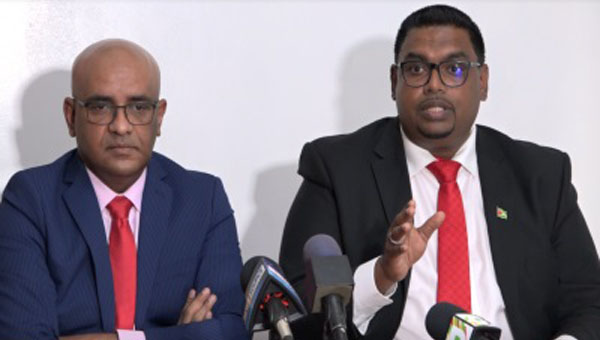GEORGETOWN, Guyana, June 16, 2020 (CMC) – The Chairperson of the Guyana Elections Commission (GECOM), retired justice Claudette Singh, said, today, that she had requested that the Chief Elections Officer, Keith Lowenfield, to prepare a report to ascertain the results of the elections in keeping with the laws of Guyana.
Political observers say that is likely to pave the way for Irfaan Ali, the presidential candidate of the main opposition, the People’s Progressive Party/Civic (PPP/C), to be declared the winner of the disputed March 2 regional and general elections.
The recount exercise ended on June 9 and the PPP/C claimed that it showed it had won the elections by more than 15,000 votes, while the ruling coalition, A Partnership for National Unity (APNU), headed by President David Granger claimed there were numerous instances of irregularities and anomalies.
In a statement, GECOM said that Lowenfield is ‘to prepare report in keeping with Section 96 of the Representation of the Act, Chapter 1:03; paving the way for official declaration of Election Results 16 June 2020”
The statement said that in her decision to the Commission on Tuesday, “Justice Singh asserted that the Commission does not have the powers of a Court of Law to examine and re-examine witnesses or to procure official documents to determine the truth of the allegations contained therein.
“The Chairperson posited that she is of the opinion that some of the allegations are of a serious nature and must be addressed. However, Article 163 (1) (b) of the Constitution confers on the High Court the exclusive jurisdiction to determine the validity of an election.”
The statement said that Justice Singh had explained that In order to give itself the authority to conduct the national recount, GECOM resorted to Article 162 (1) (b) of the Constitution to take such action as appear necessary or expedient to ensure impartiality and fairness.
“In this regard, GECOM could not have thereby clothed itself with jurisdiction to establish itself as a Court of Law to determine credibility of an election when Article 163 (1) stipulates that the High Court shall have exclusive jurisdiction to determine the legality of an election.”
She said that also that the Commission cannot arrogate onto itself a jurisdiction to annul an election since no specific power was conferred on it under Article 162 (1) (b).
“A perusal of Articles 162 and 163 of the Constitution shows that the Articles clearly and sharply separate the functions of GECOM and the High Court respectively in matters of electoral process,” the statement said.
It said that in delivering the landmark decision to the Commission, Justice Singh referenced Article 163(1)(b) then Article 71 (1)(b) of the 1996 Constitution which received judicial consideration in the case of Gladys Petrie v. Attorney General (1968) GLR 504 at 519 Bollers CJ.
“It stated the question which the court had to consider under this Article in this way: “Whether there is some general illegality either affecting the whole election or whether there has been some specific illegality being either an act or an omission which affects the results of an election” Parliament has made provision for the determination of questioning the validity of elections by way of The National Assembly (Validity of Elections) Act Chapter 1:04 of which the long title reads:- “An Act to provide for the determination of questions relating to the validity of elections of members of the National Assembly under a system of Proportional Representation.”
The marginal note to section 3(1) of the Act enacts “Method of questioning the validity of election,” the statement said, adding that according to section 57(3) of the Interpretation and General Clauses Act, Chapter 2:01; the marginal note shall be construed and have effect as part of the Act.
“Section 3(1) of the Act provides, “Any question referred to Article 163(1) (a), (b) and (c) of the Constitution may, in respect of an election referred to in Article 60(2) of the Constitution and with a view of securing appropriate remedial orders, be referred to the court and shall thereupon be determined by it in accordance with this Act and every such reference shall be by petition (hereafter referred to as an election petition).”
The statement said “in light of the foregoing and in keeping with Order No. 60 of 2020 and its addendum dated 29th May, 2020, Justice Singh requested for the Chief Election Officer to prepare and submit to the Commission a report to ascertain the results of the elections under Section 96 of the Representation of the People Act, Chapter 1:03.
“The CEO is expected to present the report to the Commission soon,” the statement noted.
 Pride News Canada's Leader In African Canadian & Caribbean News, Views & Lifestyle
Pride News Canada's Leader In African Canadian & Caribbean News, Views & Lifestyle





